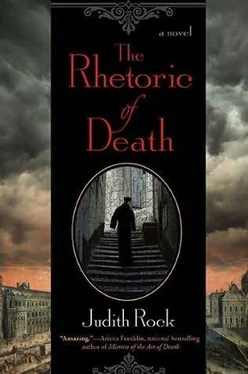Judith Rock - The Rhetoric of Death
Здесь есть возможность читать онлайн «Judith Rock - The Rhetoric of Death» весь текст электронной книги совершенно бесплатно (целиком полную версию без сокращений). В некоторых случаях можно слушать аудио, скачать через торрент в формате fb2 и присутствует краткое содержание. Жанр: Исторический детектив, на английском языке. Описание произведения, (предисловие) а так же отзывы посетителей доступны на портале библиотеки ЛибКат.
- Название:The Rhetoric of Death
- Автор:
- Жанр:
- Год:неизвестен
- ISBN:нет данных
- Рейтинг книги:3 / 5. Голосов: 1
-
Избранное:Добавить в избранное
- Отзывы:
-
Ваша оценка:
- 60
- 1
- 2
- 3
- 4
- 5
The Rhetoric of Death: краткое содержание, описание и аннотация
Предлагаем к чтению аннотацию, описание, краткое содержание или предисловие (зависит от того, что написал сам автор книги «The Rhetoric of Death»). Если вы не нашли необходимую информацию о книге — напишите в комментариях, мы постараемся отыскать её.
The Rhetoric of Death — читать онлайн бесплатно полную книгу (весь текст) целиком
Ниже представлен текст книги, разбитый по страницам. Система сохранения места последней прочитанной страницы, позволяет с удобством читать онлайн бесплатно книгу «The Rhetoric of Death», без необходимости каждый раз заново искать на чём Вы остановились. Поставьте закладку, и сможете в любой момент перейти на страницу, на которой закончили чтение.
Интервал:
Закладка:
Chapter 27
Mon pere, my master-”
“Silence, fellow!” The man on horseback raised an imperious gloved hand. “Mon pere, a word!”
Tensed for assault, arrest, or both, Charles looked from the boy in servant’s livery to the middle-aged, red-faced man on the horse. Far from laying hands on him, the two were jockeying for his attention like courtiers accosting the king. Realizing that he was holding the wheel of bread in front of him like a shield, Charles shifted it to one arm and smiled at the youngster. Then he turned to the horseman, who was slapping his tawny wool covered thigh impatiently with his riding crop.
“How may I help you, monsieur?” Charles said, smiling insincerely. The sooner well-dressed self-importance got its way, the faster it departed.
The man frowned and squinted at him. “I don’t know you. But you are a Jesuit, surely you know who I am.”
Beyond the rider, Charles saw the two police agents walk away. In tones of heartfelt relief, he said, “I have not the pleasure, monsieur.”
The man drew a long, offended breath. “Your accent tells me you are not from Paris, so perhaps that excuses you. I am Monsieur Jean Donneau de Vise, editor of the Nouveau Mercure Galant. Are you attached to the college?”
“Yes, monsieur. I am Maitre Charles du Luc,” Charles said, groaning inwardly. He had seen the Mercure, a weekly gazette reporting theatre and social news for the court and the wealthy. De Vise would no doubt be writing up Wednesday’s performance. If Charles offended this well-known journalist and playwright, Pere Jouvancy would probably scalp him and use the results to fix the mangy blond wig. “I sincerely hope, Monsieur de Vise, that we will have the honor of your presence on Wednesday.”
“That is why I stopped when I saw you. You can carry my request and I will not have to waste time going into the college. I want a better seat than I had last year. I could hardly see and couldn’t hear a thing. And make sure I am well away from the edge of that damned awning. Rain sluices off it and I will not risk wetting my good beaver hat. Good day.”
Not bothering to raise the hat in question, he turned the horse and trotted away. Charles turned with relief to the boy.
“And how may I help you?” he said.
The boy dragged his eyes away from a pretty maidservant who was smiling at him and sending an extra sway of hips his way.
“I was sent from the Hotel de Sully, mon-I mean-maitre, I heard you say?”
“Yes. And your errand?”
“The duke reminds the college to be sure a poster for the tragedy and ballet is put at our gate. You forgot last year and he didn’t like it. Will you carry that message for him?”
“A lot of people didn’t like things last year, it seems.” Charles’s wry face made the boy grin. “Yes, I will see that you get a poster. You may tell your master that the printer says we’ll have them Tuesday morning.”
“Thank you, mon pere.”The boy sketched a bow and made off after the girl.
A lay brother Charles didn’t know opened the postern. Charles thrust the bread into his arms and asked him to send it to the kitchen. Then he went to Le Picart’s office. Looking as though he was barely holding himself together under the news of this latest death, the rector was talking to Freres Brunet, Martin the doorkeeper, and Fabre. Brunet and Martin were listening tensely, but Fabre was staring at the floor.
“You have been very helpful,” Le Picart said to them. “For now, if anyone asks you, say only that Maitre Doissin was taken suddenly and violently ill and died. Lieutenant-General La Reynie is coming. When he gives permission, we will have a quiet funeral mass and burial across the river at St. Louis.”
He dismissed them and turned to Charles. “So now we have poison. And from outside the college.”
“Mon pere, Mme LeClerc saw a woman in a mourning veil pass by an hour or two ago. And, as Frere Martin no doubt told you, the gaufres were brought by someone in a veil.”
“Would a woman do this thing? Who in God’s name can she be?”
“My first thought was that it might be Antoine’s stepmother, mon pere. She is in mourning. But Mme Doute went back to Chantilly with Philippe’s body. Didn’t she?”
“I-yes-I believe so. I didn’t see her go, but-” Shaking his head, Le Picart felt for his chair and sat down heavily, like an old man. “Until we get to the bottom of this, Antoine will be either with Pere Jouvancy or Frere Brunet. He will not go to classes and he will sleep in the infirmary.” The rector sighed. “You were right, I was too complacent, and now I have Maitre Doissin’s death heavy on my conscience.”
After supper, Charles’s much-tried body overruled his frantic mind and he lay down on his bed. Compline bells woke him. He hauled himself up and went to kneel in front of the painting of Mary and the infant Jesus. But before he could bow his head to say the office, his gaze caught and held on Mary’s patient face. Show me how to find the killers, he whispered. Before more people die. He waited, every nerve stretched to listen beyond hearing and see beyond seeing. The evening light went on dimming, noise from the street hushed toward its night level, and that was all.
He resorted to bargaining. Help me, Blessed Mother, and I will put my questions aside and serve you as a Jesuit all my life. Help me crush them. Guise and his hatred, Louvois and his cruelty. The strength of his desire turned the knuckles of his clasped hands white. Mary’s gaze seemed to darken. Justice? Or revenge? Her questions were loud in the stillness. Charles bowed his head and prayed for forgiveness. Prayed to want justice and not vengeance.
Slowly, heartbeat by heartbeat, the room’s quiet filled with the Silence that came to him sometimes. He lifted his head. The painting was dim now. Mary’s half-hooded eyes veiled her thoughts. She was so often like that in paintings. Pondering things in her heart, he supposed, as Scripture said. Worrying, probably, about those three ominous gifts to the baby. Gold, frankincense, and myrrh. The myrrh especially, that bitter funeral spice, must have haunted her as she suckled her fat, happy baby. The painter had put a little window in the wall behind her. Its curtain was pulled back and its casement stood open, showing green hills dotted with tiny white sheep. The hills were suspiciously rounded and matched in size, like green breasts. Charles wondered confusedly if the painter meant to say that Mary had to suckle all the world’s poor stupid human sheep.
“Holy Queen, mother of mercy,” he prayed, imagining himself sitting beside her and talking quietly while evening filled her little room. “Hail, our life, our sweetness, and our hope. To you do we cry, poor banished children of Eve; to you do we send up our sighs, mourning and weeping in this vale of tears. Most gracious advocate, turn your eyes of mercy toward us…”
As he reached the “amen,” he looked again at the painting and noticed that the curtain at the painting’s window was red. Blue was the Virgin’s color. Did the red stand for blood? That funereal myrrh again? This red wasn’t a scarlet, flaunting red. It was more rose, such a feminine color, rose…
Charles was on his feet and out the door, words of thanks-giving tumbling from his lips as he pelted down the stairs two at a time, hardly feeling his wound. The antechamber at the stair foot was shadowed in twilight, and he nearly didn’t see Fabre at the side table, stopped in the act of putting a new candle in a copper candlestick.
“What’s happened now, maitre?” Fabre said anxiously, putting the candle down.
Charles didn’t slacken his pace. “I just remembered something, that’s all.”
“It’s after Compline! Where are you going?” Fabre grabbed at Charles’s sleeve, but Charles shook off his hand and disappeared into the street passage.
Читать дальшеИнтервал:
Закладка:
Похожие книги на «The Rhetoric of Death»
Представляем Вашему вниманию похожие книги на «The Rhetoric of Death» списком для выбора. Мы отобрали схожую по названию и смыслу литературу в надежде предоставить читателям больше вариантов отыскать новые, интересные, ещё непрочитанные произведения.
Обсуждение, отзывы о книге «The Rhetoric of Death» и просто собственные мнения читателей. Оставьте ваши комментарии, напишите, что Вы думаете о произведении, его смысле или главных героях. Укажите что конкретно понравилось, а что нет, и почему Вы так считаете.












